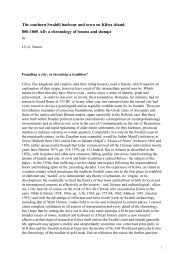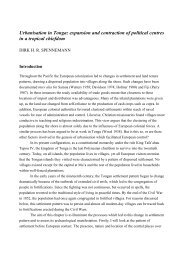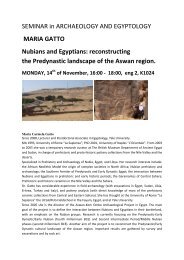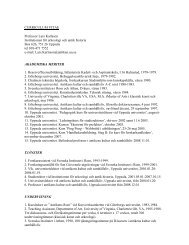Beowulf - Institutionen för arkeologi och antik historia
Beowulf - Institutionen för arkeologi och antik historia
Beowulf - Institutionen för arkeologi och antik historia
Create successful ePaper yourself
Turn your PDF publications into a flip-book with our unique Google optimized e-Paper software.
whom the hall is his classroom as he develops towards ideal manhood. Later on hall<br />
society becomes a collective in which the members, regardless of rank, have obvious<br />
duties. The king himself is an example: first of the splendid individual career<br />
towards unquestioned leadership, but later even the king becomes a member of the<br />
collective, who like everybody else has duties to perform in accordance with the<br />
formal character of his role in the hall institution.<br />
If we look at our early examples, Sigibert and Hroðgar, we see that these kings<br />
are always right whatever they decide to do. In reality they may of course have been<br />
criticised, but there is a natural ring to their being described as perfect. Later on,<br />
however, we see a tendency to criticise the wisdom of a truly kingly decision, namely<br />
the comment about Byrhtnoth’s ófer-mode. Compared with Hroðgar’s forgetfulness<br />
when he did not tell <strong>Beowulf</strong> about the existence of Grendel’s mother,<br />
Byrhtnoth’s ófer-mode, the decision to fight rather than to withdraw, is a small point<br />
in the criticism of leadership, since he did not deliberately withhold any crucial information.<br />
He misjudged the situation. We may argue that it is the divine character of the<br />
Migration Period king which explains Hroðgar’s forgetfulness of earthly matters and<br />
that Byrhtnoth should be criticised since he is not kin to any of the gods. This line of<br />
argument leads, however, to the same conclusion, namely that leaders are becoming<br />
more equal to their retainers.<br />
From later periods there are even more striking examples. In Saga Hákonar<br />
goða (Heimskringla, vol. III, Ch. 14 ff.; translation, Hollander 1964, pp. 106 ff.)<br />
Snorre Stulasson depicts a conflict situation in a hall. Here the hall is the gathering<br />
place for the invited assembly of the aristocracy, i.e., the farmers of the Trondheim<br />
District, who are engaged in the performance of the mid-winter or Yule offerings—<br />
the communal meal sponsored by the top of the local aristocracy, the earl at Hlaþír,<br />
Sigurð. The ceremony is chaired by the King, Hakon the Good, but being a Christian<br />
the King has difficulties performing his duties and he is criticised by the assembly.<br />
This criticism is based on the opinion that as a member of the assembly, as well as its<br />
head, he must drink from the horn dedicated to the gods and eat of the consecrated<br />
meat. What the King, rather vainly, tries to do is first to refuse and later to change the<br />
ritual so that it may suit him as well as the farmers gathered in the hall, but he succeeds<br />
only thanks to the intervention of Sigurd Jarl, and neither party is satisfied with<br />
the sacrificial feast. The King and the Earl fall back upon the more basic and also<br />
more informal and indisputable privilege pertaining to the King as the foremost<br />
among the aristocrats, namely the right to lay down rules for formalised and ritual<br />
behaviour in the hall. In this saga we witness a kind of discussion, although it does not<br />
go as far as a real argument, like the one that took place earlier in the saga at the<br />
Frostathing Assembly.<br />
Whatever happened in the hall at Hlaþír, (cf. Hultgård 1993, pp. 224 ff.) it was,<br />
at least for Snorre Sturlasson, reasonable to imagine a revolt in the hall, and to argue<br />
that the revolt could have emanated from the invited guests. The reason for this must<br />
169








